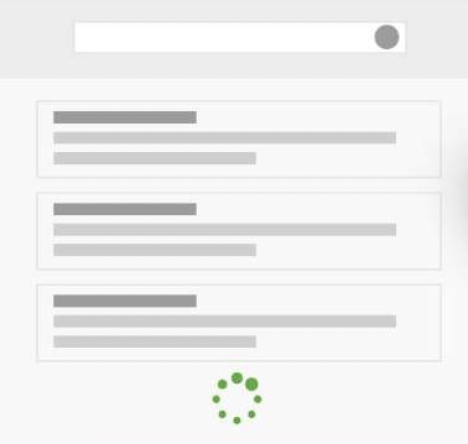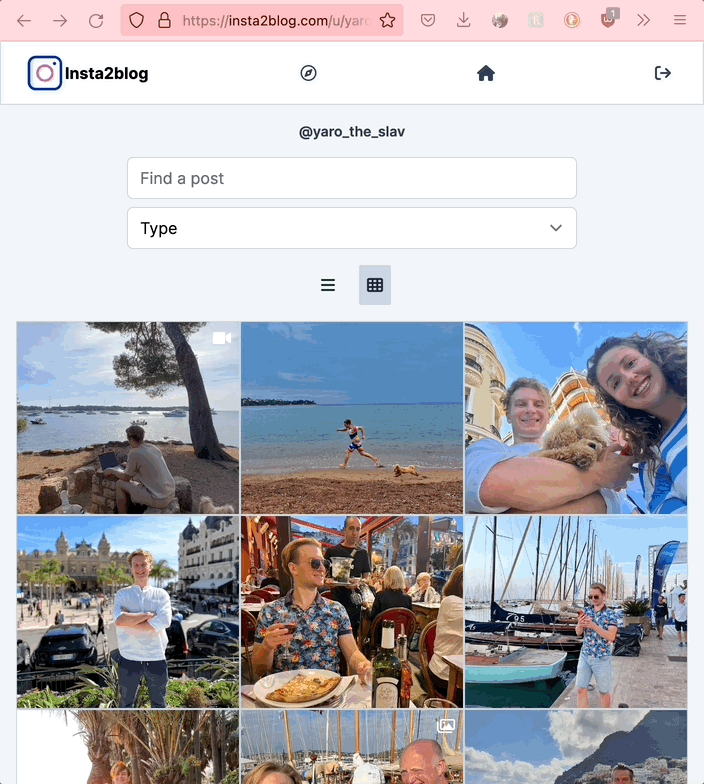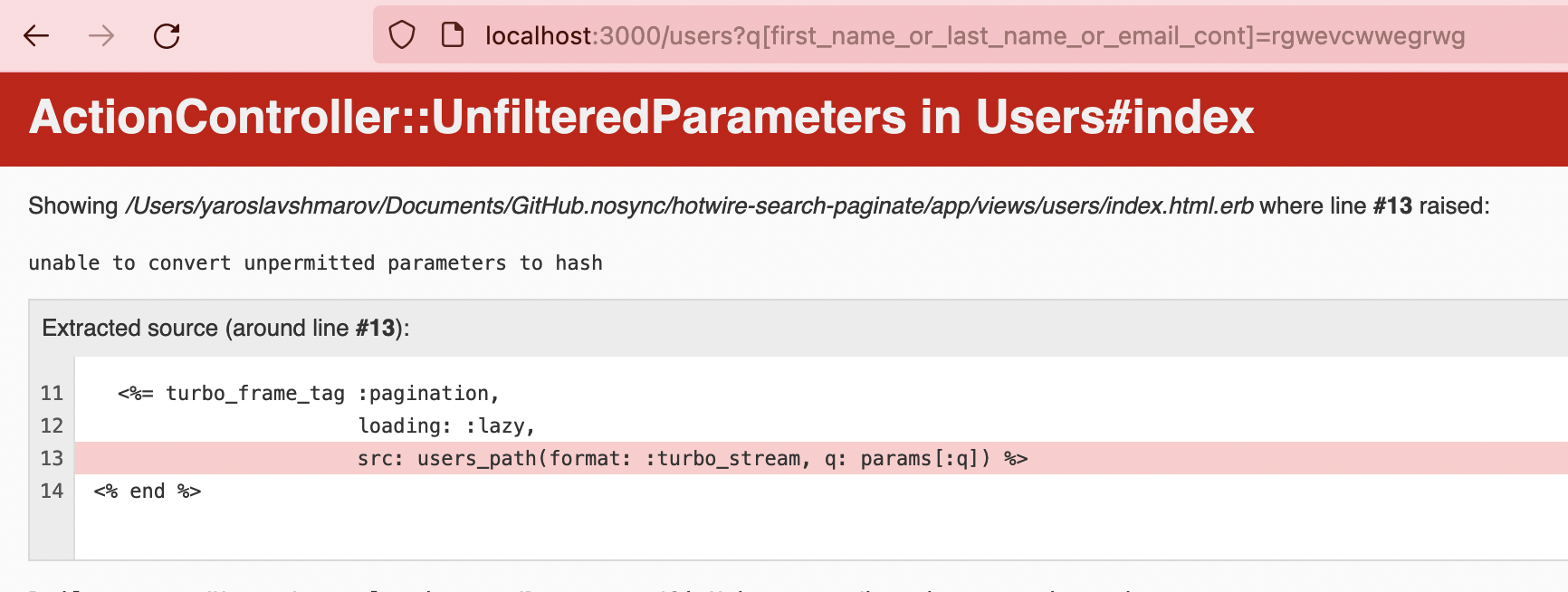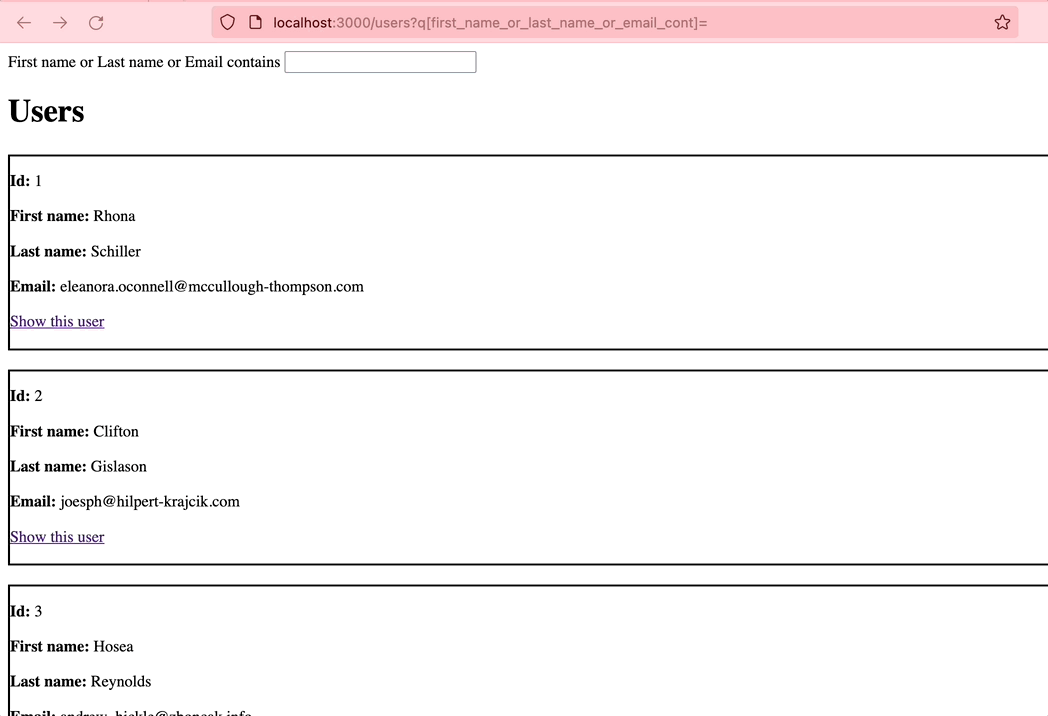 Hotwire Search Infinite Pagination
Hotwire Search Infinite Pagination
We’ll build search and infinite pagination that work well together. Basically a similar UI:

It’s been ±9 months since I did my first post about pagination & search with Hotwire.
This is my perfected approach, extracted from my latest implementation. Here’s how search + infinite pagination works on my website:

Let’s implement something similar!
1. Search & paginate with Pagy, without Ransack #
Install pagy:
bundle add pagy
# config/initializers/pagy.rb
require 'pagy/extras/countless'
# app/helpers/application_helper.rb
module ApplicationHelper
include Pagy::Frontend
end
# app/controllers/application_controller.rb
class ApplicationController < ActionController::Base
include Pagy::Backend
end
Search (without a gem) and pagination (with pagy) in the controller:
# app/controllers/users_controller.rb
class UsersController < ApplicationController
def index
users = User.order(created_at: :desc)
users = users.where('last_name ilike ?', "%#{params[:last_name]}%") if params[:last_name].present?
users = users.where(category: params[:category]) if params[:category].present?
@pagy, @users = pagy_countless(users, items: 5)
end
end
The index view:
- Search field is outside of turbo frame, with target
turbo_frame; submit on input/change - empty div that will be populated with results
- The second, inner lazy-loaded
turbo_framewill make a request and respond withindex.turbo_stream.erb
# app/views/users/index.html.erb
<%= form_with url: users_path,
method: :get,
data: { turbo_frame: 'results' } do |form| %>
<%= form.text_field :last_name,
placeholder: 'User last_name',
value: params[:last_name],
autocomplete: 'off',
autofocus: true,
oninput: 'this.form.requestSubmit()' %>
<%= form.select :gender,
['male', 'female'],
{ include_blank: 'Category' },
{ onchange: 'this.form.requestSubmit()' } %>
<% end %>
<%= turbo_frame_tag 'results', target: '_top', data: { turbo_action: 'advance' } do %>
<div id="users"></div>
<%= turbo_frame_tag 'pagination',
src: users_path(last_name: params[:last_name],
category: params[:category],
format: :turbo_stream),
loading: :lazy %>
<% end %>
loading: :lazy on a turbo_frame means that the request will perform as soon as the element becomes visible in the page. You will replace the empty div with a collection of users, and re-render the pagination turbo_stream under the added users collection:
# app/views/users/index.turbo_stream.erb
<%= turbo_stream.append "users" do %>
<% @users.each do |user| %>
<%= render partial: 'users/user', locals: { user: } %>
<% end %>
<% end %>
<% if @pagy.next.present? %>
<%= turbo_stream.replace "pagination" do %>
<%= turbo_frame_tag "pagination",
src: users_path(page: @pagy.next,
last_name: params[:last_name],
category: params[:category],
format: :turbo_stream),
loading: :lazy %>
<% end %>
<% end %>
This should work well! However we search only by last_name. Let’s add more advanced search: by last_name/first_name/email. We can easily do such a query with the gem ransack.
2. With Ransack #
bundle add ransack
# app/views/users/index.html.erb
<%= search_form_for @q, data: { turbo_frame: :results } do |f| %>
<%= f.label :last_name_or_body_cont %>
<%= f.search_field :last_name_or_body_cont, autofocus: true, autocomplete: 'off', oninput: 'this.form.requestSubmit()' %>
<% end %>
# app/controllers/users_controller.rb
class UsersController < ApplicationController
def index
@q = User.ransack(params[:q])
@pagy, @users = pagy_countless(@q.result(distinct: true).order(created_at: :asc), items: 2)
end
end
# app/views/users/index.html.erb
<%= turbo_frame_tag :pagination,
loading: :lazy,
src: users_path(format: :turbo_stream, q: params[:q]) %>
# app/views/users/index.turbo_stream.erb
<%= turbo_frame_tag :pagination,
loading: :lazy,
src: users_path(format: :turbo_stream, q: params[:q], page: @pagy.next) %>
2.1. Fix Ransack ActionController::UnfilteredParameters #
If you add params[:q] to an url, you might get an error unable to convert unpermitted parameters to hash:

There are 2 ways to fix it.
Option 1: Permit all incoming query params params[:q]&.permit!:
# app/controllers/users_controller.rb
class UsersController < ApplicationController
def index
@q = User.ransack(params[:q]&.permit!)
@pagy, @users = pagy_countless(@q.result(distinct: true).order(created_at: :asc), items: 2)
end
end
However this can be considered not very safe, because a malicious actor could try to dig sensitive data this way.
Option 2: safer approach.
Allow an unsafe hash input in the views with params[:q]&.to_unsafe_h:
users_path(format: :turbo_stream, q: params[:q]&.to_unsafe_h, page: @pagy.next)
However in the controller you can explicitly state the query params that you want to enable with params.permit. In this case, we would also need to permit format:
# app/controllers/users_controller.rb
class UsersController < ApplicationController
def index
search_params = params.permit([:format, q: [:s,:last_name_or_body_cont]], :page)
@q = User.ransack(search_params[:q])
@pagy, @users = pagy_countless(@q.result(distinct: true).order(created_at: :asc), items: 2)
end
end
Final result:

That’s it! 🎉🥳🍾
Did you like this article? Did it save you some time?
